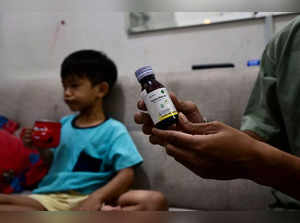 AFP
AFPThe investigation "strongly suggests" that medications contaminated with DEG or EG imported into The Gambia led to this AKI cluster among children, it said adding that AKI outbreaks associated with DEG-contaminated pharmaceutical products have been documented in Panama, Nigeria, and Haiti.
 ET Bureau
ET BureauAs of September 29, 2022, the ministry of health had identified 78 clinically suspected AKI cases. Among these patients, 66 (85%) died. Most patients (75%) were aged less than two years, and 60% were male.
On October 5, World Health Organization (WHO) announced that the deaths of dozens of children in The Gambia from acute kidney injuries might be linked to contaminated cough and cold syrups made by Indian drug manufacturer Maiden Pharmaceuticals.
A committee was set up by the Indian government to investigate the "mysterious deaths" of children in The Gambia. However, it submitted the report in January this year and did not find any "substantial evidence" for establishing causality between the medicine and the deaths.
The 'Morbidity and Mortality Weekly Report' published by the CDC on Friday reached its conclusions by reviewing the medical records of 52 (67%) of the 78 identified patients with suspected AKI. "Interviews with at least one caregiver of each of 27 patients were conducted by investigators in local languages, including the caregivers of 20 patients whose children's hospital medical records were reviewed and seven patients whose medical records could not be located."
Among the 56 included patients, more than one-half (54%) experienced fever as their first signs or symptoms, and 50% experienced vomiting. Approximately one-third (34%) had diarrhoea.
"During the course of illness, all patients experienced anuria and fever, 95% experienced vomiting, and 73% experienced diarrhoea. Nearly one-half (48%) experienced anorexia or reduced feeding," the investigations revealed.
Abnormal laboratory test results were received by 66-100% of patients, including impaired renal and liver function, thrombocytosis, and mild to moderate anaemia. Fourteen patients underwent peritoneal dialysis, and one patient underwent hemodialysis; all 15 patients who received dialysis died.
According to the report, all caregivers reported that the child consumed a prescription or over-the-counter syrup-based medication (including paracetamol) before the onset of anuria. Twelve patients (47%) had consumed four or more medications before being hospitalised.
The laboratory analysis of 23 medication samples conducted by the health ministry and WHO confirmed that four products from Maiden Pharmaceuticals in Haryana contained DEG and EG.
Based on records from The Gambia's Medicines Control Agency, all medications that tested positive for DEG and EG were imported into the African nation on June 21, 2022, shortly before the occurrence of the first AKI cases.
(Catch all the Business News, Breaking News, Budget 2024 Events and Latest News Updates on The Economic Times.)
Subscribe to The Economic Times Prime and read the ET ePaper online.
(Catch all the Business News, Breaking News, Budget 2024 Events and Latest News Updates on The Economic Times.)
Subscribe to The Economic Times Prime and read the ET ePaper online.









 Get Unlimited Access to The Economic Times
Get Unlimited Access to The Economic Times
